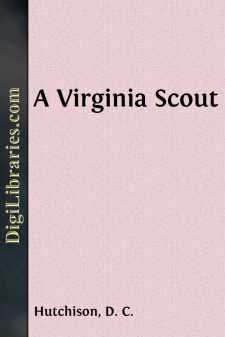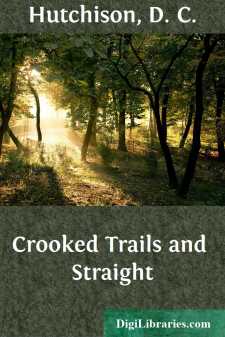Categories
- Antiques & Collectibles 13
- Architecture 36
- Art 48
- Bibles 22
- Biography & Autobiography 813
- Body, Mind & Spirit 142
- Business & Economics 28
- Children's Books 15
- Children's Fiction 12
- Computers 4
- Cooking 94
- Crafts & Hobbies 4
- Drama 346
- Education 46
- Family & Relationships 57
- Fiction 11828
- Games 19
- Gardening 17
- Health & Fitness 34
- History 1377
- House & Home 1
- Humor 147
- Juvenile Fiction 1873
- Juvenile Nonfiction 202
- Language Arts & Disciplines 88
- Law 16
- Literary Collections 686
- Literary Criticism 179
- Mathematics 13
- Medical 41
- Music 40
- Nature 179
- Non-Classifiable 1768
- Performing Arts 7
- Periodicals 1453
- Philosophy 64
- Photography 2
- Poetry 896
- Political Science 203
- Psychology 42
- Reference 154
- Religion 513
- Science 126
- Self-Help 84
- Social Science 81
- Sports & Recreation 34
- Study Aids 3
- Technology & Engineering 59
- Transportation 23
- Travel 463
- True Crime 29
A Virginia Scout
by: D. C. Hutchison
Categories:
Description:
Excerpt
CHAPTER I
THREE TRAVELERS
It was good to rest in the seclusion of my hollow sycamore. It was pleasant to know that in the early morning my horse would soon cover the four miles separating me from the soil of Virginia. As a surveyor, and now as a messenger between Fort Pitt and His Lordship, the Earl of Dunmore, our royal governor, I had utilized this unique shelter more than once when breaking my journey at the junction of the Monongahela and the Cheat.
I had come to look upon it with something of affection. It was one of my wilderness homes. It was roughly circular and a good eight feet in diameter, and never yet had I been disturbed while occupying it.
During the night I heard the diabolic screech of a loon somewhere down the river, while closer by rose the pathetic song of the whippoorwill. Strange contrasts and each very welcome in my ears. I was awake with the first rays of the sun mottling the bark and mold before the low entrance to my retreat. The rippling melody of a mocking-bird deluged the thicket. Honey-bees hovered and buzzed about my tree, perhaps investigating it with the idea of moving in and using it for a storehouse. The Indians called them the “white man’s flies,” and believed they heralded the coming of permanent settlements. I hoped the augury was a true one, but there were times when I doubted.
Making sure that the priming of my long Deckhard rifle was dry, I crawled out into the thicket and stood erect. As far as the eye could roam stretched the rich bottom-lands and the low ridges, covered with the primeval growths of giant walnuts, maples, oaks and hickory. Small wonder that the heart of the homeseeker should covet such a country.
Groves of beeches, less desired by settlers, were noisy with satisfied squirrels. From river to ridge the air was alive with orioles and cardinals and red-starts. And could I have stood at the western rim of my vision I would have beheld the panorama repeated, only even richer and more delectable; for there was nothing but the ancient forest between me and the lonely Mississippi.
Birds and song and the soft June air and the mystery of the Kentucky country tugging at my heartstrings. I felt the call very strong as I stood there in the thicket, and gladly would I have traveled West to the richest game-region ever visited by white men. From some who had made the trip I had heard wonderful stories of Nature’s prodigality. There were roads made through tangled thickets by immense herds of buffaloes smashing their way five abreast. Deer were too innumerable to estimate. To perch a turkey merely required that one step a rod or two from the cabin door. Only the serious nature of my business, resulting from the very serious nature of the times, held me back.
On this particular morning when the summer was in full tide of song and scents and pleasing vistas, I was bringing important despatches to Governor Dunmore. The long-looked-for Indian war was upon us. From the back-country to the seaboard Virginians knew this year of 1774 was to figure prominently in our destiny....





